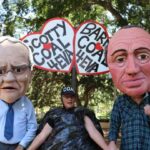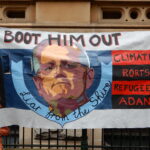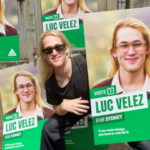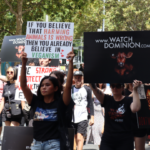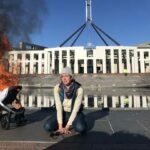This Election the Climate Crisis Is a Major Party Nonissue: Interview with Rising Tide’s Alexa Stuart
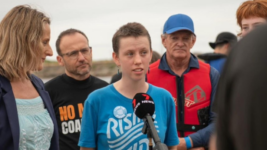
“Mr Albanese, you say you care about young people, and yet, since getting elected your government has approved 33 new coal and gas projects,” 21-year-old Alexa Stuart called out to the prime minister, whilst he was hosting a 7th April 2025 press conference in the Sydney suburb of Ashfield, which involved a $1 billion election pledge to improve mental health.
“You’re condemning young people, like me, to a life of climate disasters,” the climate defender threw in for good measure. “Of course, we have poor mental health issues.”
The aspect of Stuart’s protest outburst that resonated with many in the community is that she delivered it in a manner that openly displayed the traumatic impact that the crisis is having on her, as a woman in her early 20s, who at 15 clued into the fact that she wouldn’t be having the type of future adults of today are having, as they continue to live extravagantly fossil fuel-driven lifestyles.
Stuart has been outspoken on the climate crisis for a number of years now, especially in the capacity of a member of climate defence group Rising Tide, which has garnered global headlines over recent years, in response to its annual People’s Blockade of the World’s Largest Coal Port on Awabakal and Worimi land in the NSW regional town of Newcastle.
Indeed, to come of age in today’s world, not only are young people, like Alexa, having to come to terms with the fact that the climate crisis has long been off to a flying start, but now as it reaches something of a gallop, most adults around them are simply getting on with “business as usual”.
Ending climate as an election issue
Albanese stood on the podium at the end of the 2022 national vote for federal government and proclaimed that his taking out the highest ministerial office in the country meant that Australia then had the opportunity “to end the climate wars”, which was always an oddly ambiguous way to phrase what many assumed he was proposing to do: take climate action to counter the crisis.
Then in her later teens, Stuart had real hope that Albanese was sincere about taking adequate action on climate. Yet now she’s confronted with the disheartening fact that Labor and environment minister Tanya Plibersek were just talking the talk the people like to hear, whilst cutting the backdoor deals that fossil fuel lobbyists like to see, which keeps the party in power.
Stuart, who’s become a prominent voice amongst climate defenders of late, further notes that the majors aren’t even prioritising climate as an election issue this year, which in interpreting Albanese’s pledge to “end the climate wars” in a different way might mean Labor has fulfilled its promise, as it has succeeded in making climate a nonissue, with no competing major party policies to address it.
Sydney Criminal Lawyers spoke to Rising Tide spokesperson Alexa Stuart about why she considers her solo protest against the prime minister rung so true for so many in the constituency, the fact that both major parties don’t appear to care about her future or those of all other young people, and that Rising Tide and other climate defence groups need to put the issue back on the election agenda.
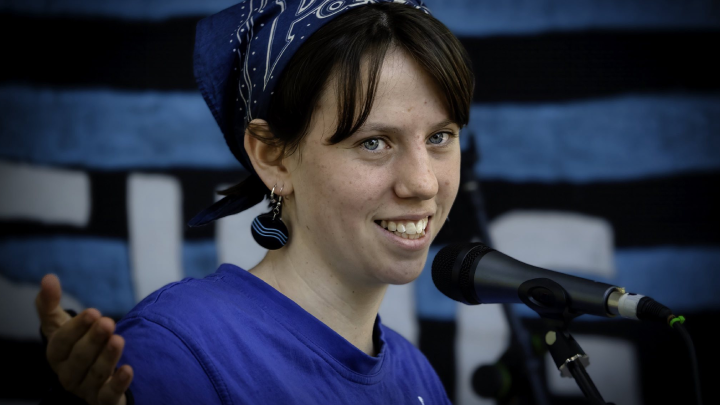
Prime minister Anthony Albanese recently held a press conference in the Sydney suburb of Ashfield to announce an election pledge, involving an additional $1 billion to be invested into mental health access and support, with $500 million of it slated for youth.
Alexa, you dramatically interrupted the PM mid-speech, calling out “Mr Albanese, you say you care about young people, and yet, since getting elected your government has approved 33 new coal and gas projects.”
And this is also the PM, who on being elected in 2022, promised to end the climate wars.
So, how would you describe the Albanese government’s form on climate over the last three years? And why did you highlight young people’s mental health as you called Albanese out on climate?
Labor and Albanese promised to end the climate wars. The PM said he wanted his legacy to be climate action, but instead, what we’ve seen is the Labor government approve 33 new coal and gas projects since being elected.
We know that we are in a climate crisis, and the science could not be clearer: we need to stop approving new coal and gas projects.
Instead, we should be urgently phasing out fossil fuels. So, to hear and see Labor claim to be really strong on climate and yet, continue to pour fuel on the fire is pretty devastating.
I felt quite hopeful at the last election, when Labor did get elected: that we would see real action – real change.
But now we know both major parties are so captured by the fossil fuel industry that they don’t have enough courage to act in the way that we need to on climate.
I wanted to also draw attention to the hypocrisy of our government, who, one the one hand, wants to portray the image that they really care about young people, but on the other, they’re condemning us to a future of climate catastrophe and increasing climate disasters.
This election we are seeing both major parties don’t want to talk about climate. Yet, we know it is one of the most important issues for people.
So, Rising Tide and me, personally, want to make sure that it’s put back on the agenda where it belongs.
In early 2022, climate action in NSW was picking up post-pandemic, which is when the Perrottet government rolled out its draconian antiprotest laws. This regime has had a major chilling effect on people willing to breach these restrictions, as they carry up to two years prison time.
But the climate group you’re a part of, Rising Tide, has continued to hold its annual protest that serves to block the shipping lane leading into Newcastle Coal Port, which is the largest such port in the world.
Last November, premier Chris Minns pulled out all the stops to prevent the direct action from happening.
But regardless of this, over 200 climate defenders broke the law to block the harbour, which meant they were all risking up to 2 years imprisonment, and 138 protesters were eventually charged with disrupting a major facility, under the draconian NSW antiprotest laws.
What does it mean that so many Rising Tide participants were willing to break those laws, despite the threat of serious time in prison? And what does it say about the 2022 NSW antiprotest regime?
People are freaked out about the climate crisis, and they’re angry that our government isn’t doing more. So, the people are going to take action, and the threat of harsher penalties isn’t going to deter them.
If our government is going to continue to approve new coal and gas projects, then they can expect to keep seeing civil disobedience protests happening, and that’s what we saw at the blockade last year.
For me personally, I’ve been protesting since I’ve been 15. I’ve written countless letters to MPs, signed petitions and protested in the right way and yet, we are still seeing young people’s voices being ignored and the science being ignored.
People are feeling angry, frustrated and desperate to be heard, so it is no surprise that we are seeing these continued protests even as the government tries to crack down.
Last year’s Newcastle Rising Tide action was such a show of people power because the blockade was still able to go ahead despite the government throwing everything that they could at it to try and prevent the event from happening.
Your personal protest action on 7 April was impressive in many ways. But one thing that struck me was the level of emotion you expressed as you were calling the prime minister out on his climate inaction.
Often people display anger during protests, but your emotion seemed to tend towards something like grief. Can you talk about that?
Ever since I’ve been 15, I’ve been incredibly concerned about the climate crisis. When I think about my future, I cannot help but think about increased floods, fires, droughts, famines, conflicts and food scarcity, which is all that we are going to see.
So, I’ve been dealing with these emotions for five or six years now, since I was a young teenager. So, when I saw Mr Albanese is front of me and had an opportunity to send a message directly to him, all of those years of bottled-up emotions just spilled out.
That was especially as Mr Albanese was talking about supporting mental health, at the same press conference, at which a psychologist had drawn the link between climate and deteriorating mental health.
So, I just felt the anger and rage and grief over our climate so strongly, and it all just flowed out, in a way that hopefully resonated with Albanese and the public.
Going back pre-pandemic there appeared to be a new climate report delivering ever-worsening statistics released every other month.
This sort of thorough reporting around the climate crisis has died down post-pandemic, but the breaking of climate thresholds and the rise in evermore extreme weather events have clearly been increasing since COVID ended.
How would you describe the state of the climate crisis at this point in time? What can be expected if politicians continue to ignore pleas?
Things are dire. We are already seeing and feeling the impacts of the crisis here in Australia.
Of course, we had the devastating impacts of the 2019 summer bushfires and the floods in the Lismore region, which, this year, we saw again with Cyclone Alfred, and when you look around the world, it is just rolling climate disasters all the time.
This is already impacting millions of people’s lives and it’s pretty clear that if we continue on the path that we are on that we will see deaths in the millions caused by climate – possibly even more.
Other science is suggesting that large parts of Australia will become unliveable because of the climate.
So, for me, when I look at the future, I imagine, based on the science, heatwaves and fires every summer, and more severe storms, which will be impacting people that I love and myself in a very real way.
The Paris Climate Agreement was clear about what we need to be doing globally, and yet, we see that Australia is not going to meet our targets for that 2015 accord, in any way, shape or form, and for a young person, that’s devastating.
Lastly, Alexa, your headline grabbing solo protest was staged because the next federal election is happening in May. You’re upset about the current government’s form over its last term in parliament, but truth be told, the opposition is much worse on this issue.
So, as a young Australian, who has been at the forefront of the climate movement for many years now, what are you hoping the outcome will be at the ballot box next month? And further, what if the next parliament doesn’t take the commonsense initiative to address the heating planet?
What we are seeing is more and more people, especially young people, turning away from the two major parties, because the two-party system is broken.
Both the major parties have no real climate policies, as they receive huge donations from the fossil fuel industry.
People are turning to minor parties, like the Greens, and to independents, which, on the whole, is a positive trend, as it will send a message to the government and the opposition – to both parties – that they need to be doing more on climate.
If we continue to see both major parties continue to ignore climate as an issue and not having any real solutions to the climate crisis, then they can expect there to be, firstly, many more protests, like the actions we have seen recently, and secondly, they can expect their vote to continue to drop especially amongst young people, who continue to be fed up with politics.


